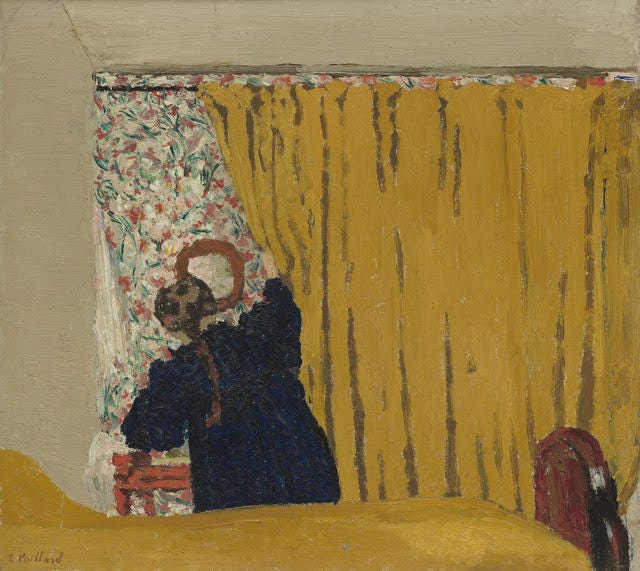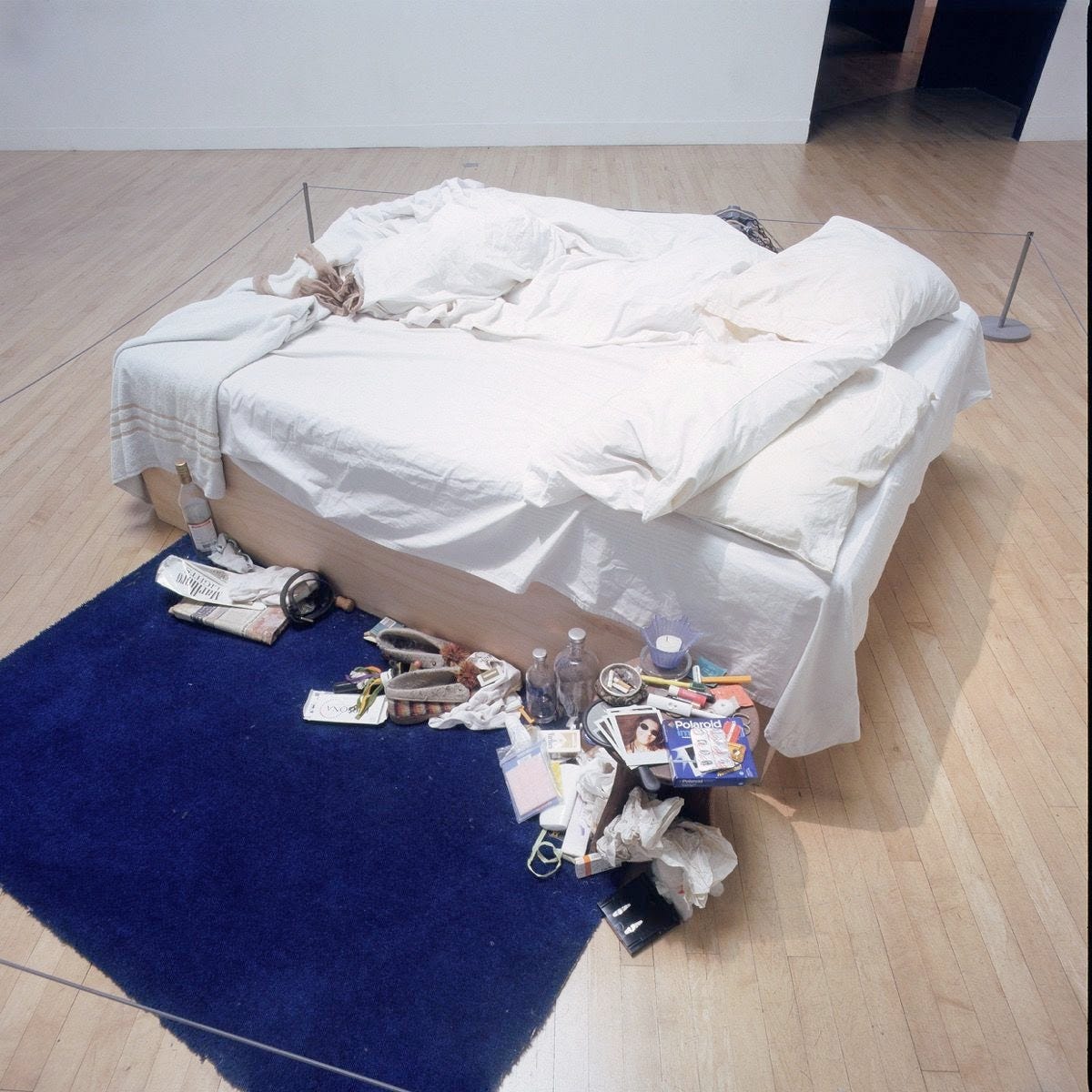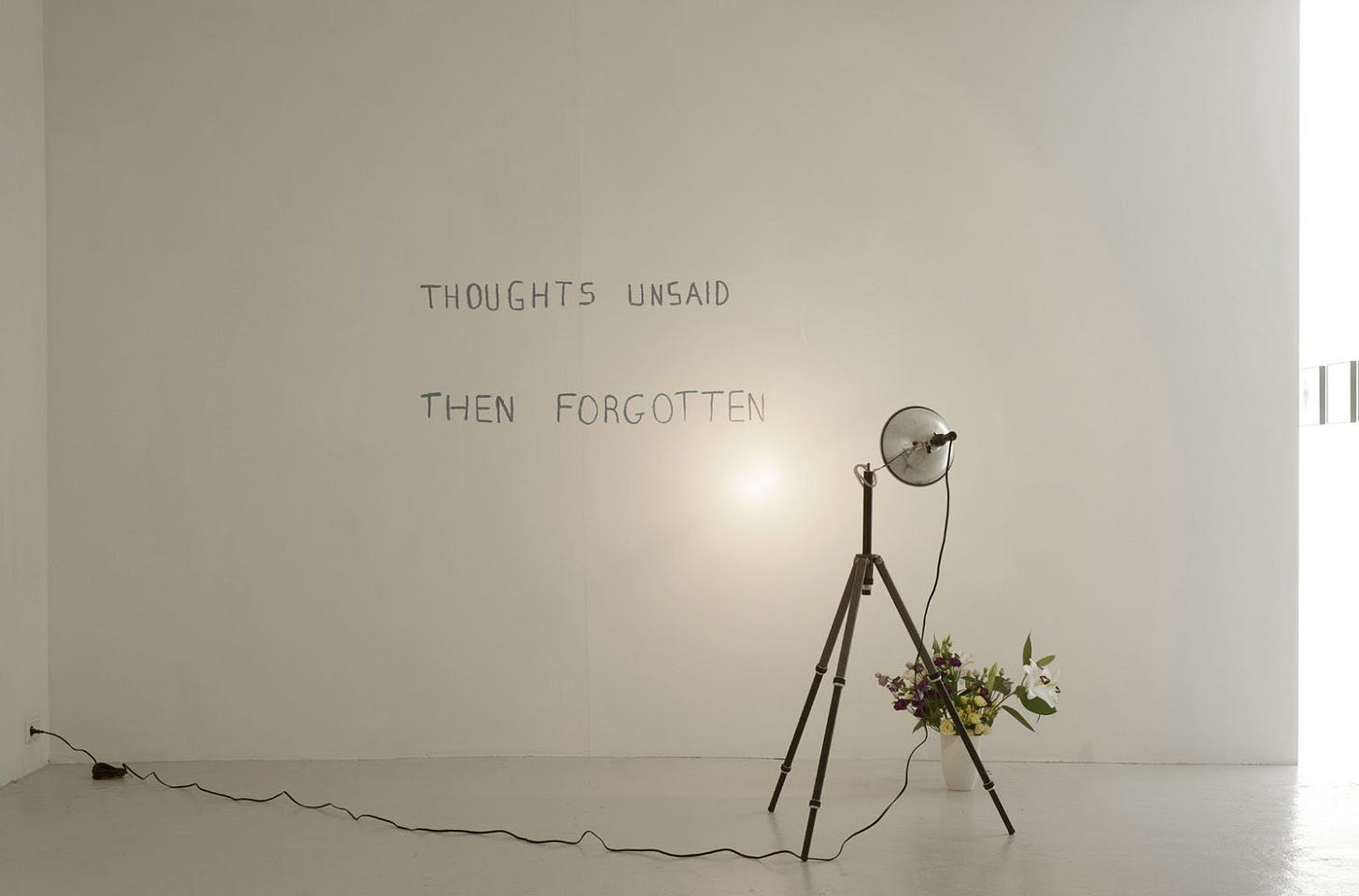
Edouard Vuillard’s The Yellow Curtain (1893)
Objective: A solitary existence on the bed
She’s always spent a lot of time alone, so in a way, she feels incredibly prepared for the situation. In high school, she spent many hours sitting on her bed experimenting with makeup on herself, with a mirror propped up against the corner of the bed frame. Otherwise, she’d be watching Youtube videos of other people talking about the mundanity of their own lives, rather enthusiastically for the subject matter. Or maybe making overly-rendered pencil drawings of models in magazines or actors in movies that she had screen-shotted. She also spent a lot of time doing her homework.

Tracey Emin’s My Bed (1998)
Things haven’t changed drastically for her personally since the last time she lived with her parents, aside from their two moves and her going and returning from college. Overall, she doesn’t feel too different as a person. The hours at home that aren’t spent sleeping in her bed are often still spent sitting on it: laptop on and playing music, planner open to a half-completed checklist, at least two sketchbooks, an overflowing pencil case, maybe a book. An international pandemic that has forced people who can stay home to do so (for two months now) has only exacerbated her routine atop the bedroom’s central feature. She knows that supposedly she would be more productive if she worked in a physically separate space away from her bed and that it would help her to relax more completely at the end of the day, even sleep better. But frankly, she doesn’t have much trouble falling asleep. In fact, she has a very active imagination that she utilizes to consciously construct her dreams as she’s drifting off to sleep… but yes, she can see the positives of this work/life set up. Maybe if she had a bigger room with an absurdly oversized table where she could spread out all her things she would move away from the bed, as the flat expanse is the main draw after all. But that set up seems very far out of reach, so there’s no way to really know what she would do.

Still from Fat Girl (dir. Catherine Breillat, 2001)
She finds this isolation brought on by the pandemic familiar, but also very different from her isolation in the past. She’s in a different house, on a different bed than she was in high school, but the basic setup remains unchanged. The primary difference is the lack of FOMO (Fear Of Missing Out). She used to read books and watch movies with the mindset that other people were living more real lives, filled with romance and extensive dramas that involved many people and interfered with home life or work or other personal relationships. In high school she used to get confused about how coming-of-age movies were so dramatic; she was the same age as the characters, but most of her time was spent doing school work or having very fun but somewhat unexceptional interactions with friends. Now she realizes it’s only a matter of perspective, phrasing, and writing it down. There is really nothing stopping her from writing about her own mundane life or inner monologues; there are millions of people with their own personal dramas that, chances are, pose some semblance of interest to at least one other person in the world, if not a few. Her mind often goes off on tangents that could be expanded into stories, it’s only a matter of catching them in time before her mind moves on to the next idea. She wonders if everyone thinks like this: she’ll spend a few weeks thinking that of course, everyone does, that she’s not special, and then she’ll switch to thinking that it is awfully presumptive of her to believe everyone in the world is like her, that she’s so self-centered.

Bas Jan Ader’s Thoughts unsaid, then forgotten (1973)
She has begun to write some ideas down, realizing that the only difference between her and people who make stories is simply making them. This realization has always kind of been in her mind, but it is funny how you can think something your whole life and then one day understand it.
Since she’s begun utilizing her Notes app for ideas, in addition to her usual disjointed lists, she has realized she likes the distance of writing in the third person. She finds freedom in the room to hyperbolize or generalize or fictionalize freely within this narrative perspective. If someone challenges her on a point, she can say, “Oh, no, no, I was writing about a fictional character.” Of course, she isn’t sure who would challenge her on any of the above points, since she is locked in her own room on her bed by herself, silently thinking up all of this.

Jason C. from Adrienne Salinger's My Room: Teenagers in Their Bedrooms (1995)
But another part of her fears this voice is not wholly hers but is perhaps a product of her reading the work of Sally Rooney, and maybe becoming too immersed in that world. But then she thinks, “If that’s the thing that’s going to get me to write, then it’s justified.” She also has to remind herself that Ms. Rooney doesn’t own the third person and that she should probably read more books to get a fuller picture of the scope of literary voices. Luckily, she can do that from her bed.

Sailor moon’s bedroom
This letter was written by Zola Anderson. She can be contacted by email zolabanderson@gmail.com or through Instagram @zo1ita
If you’d like to create a letter, send an email of interest to jwenzhuang@gmail.com, or @wenevernever


